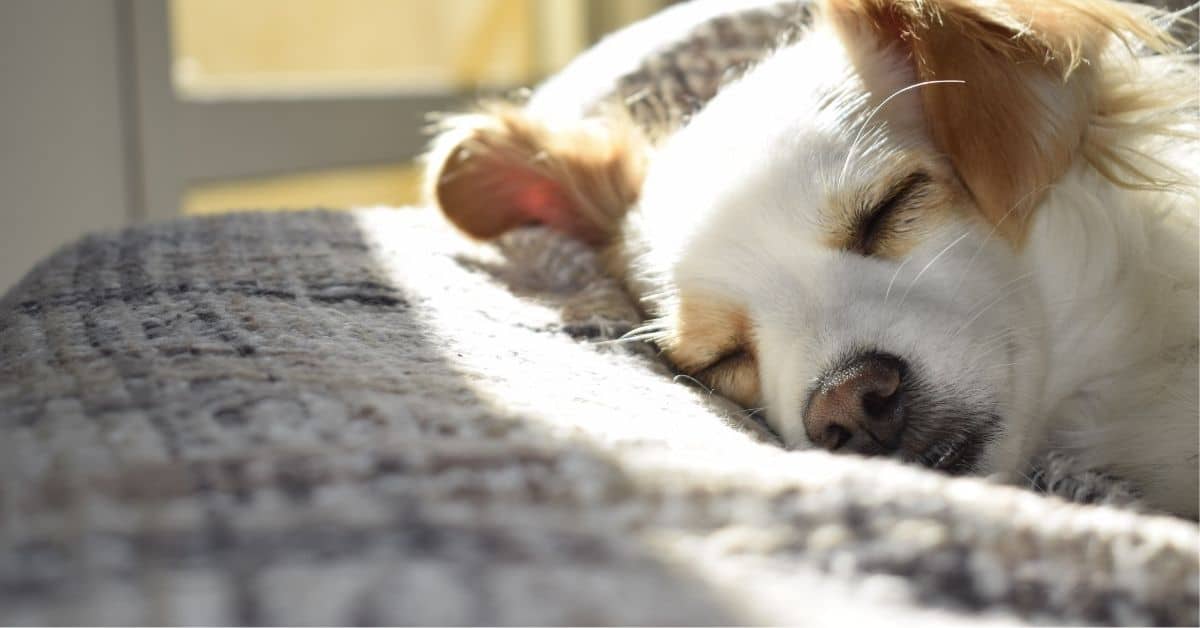Picture this: Your furry friend is nestled in their bed, eyelids shut tight, deep in slumber.
Suddenly, you hear a whimper, a growl, or maybe even a soft bark.
Startling, isn’t it?
But why do dogs make noise when they sleep?
Just like with humans, dogs’ sleep behavior can be as complex as it is intriguing.
This article is here to explore this mystery and put your worries to bed.
Exploring The Dog’s Sleep Cycle
Understanding Canine Sleep Patterns
The key to understanding these nocturnal vocalizations lies in understanding canine sleep patterns.
Dogs sleep in cycles like we do, albeit with some differences.
They need more sleep than us—usually 12-14 hours a day—and their sleep cycle is faster, typically switching from light sleep to deep sleep, and then REM sleep within 20 minutes.
Rem Sleep In Dogs
It’s during the REM (Rapid Eye Movement) phase that the magic happens.
Dogs, like humans, dream during REM sleep.
During this stage, their brain activity spikes, mimicking their awake state.
This stage accounts for about 10% of their sleep cycle and it’s often when you’ll notice twitching, tail wagging, or noise-making.
The Role Of Dreams
Just as humans dream about their daily lives, studies suggest that dogs, too, dream about doggy things.
Chasing a squirrel, fetching a ball, or a joyous reunion with you—these dreams could bring about vocalizations that reflect the dream’s content, like barking, growling, or whimpering.
Decoding The Noises
Barking Or Whining In Sleep
When your dog barks or whines in sleep, it’s likely they’re dreaming about scenarios that would typically trigger such reactions in their waking hours.
A dream about an encounter with a squirrel or another dog, for instance.
The noises are likely just their subconscious responses to these dream stimuli.
Twitching And Paddling
You might also observe twitching or ‘paddling’ movements.
It’s like watching a muted movie of their daytime adventures!
The paddling might just be them running in a dream field, while twitching could reflect smaller actions like shaking off after a dream swim.
Snoring
Snoring is common in dogs, especially breeds with short noses like Bulldogs or Pugs.
It’s usually no cause for alarm, unless the snoring is extremely loud, irregular, or your dog seems to struggle for breath, which could indicate a health issue like obstructive sleep apnea or brachycephalic syndrome.
Understanding When Noise Is A Sign Of Distress
Sleep Disorders In Dogs
While many nocturnal dog noises are harmless and simply a result of dream-filled REM sleep, it’s crucial to be aware of sleep disorders in dogs.
Conditions like sleep apnea, narcolepsy, or restless leg syndrome could cause unexpected noises and should be addressed promptly.
These conditions often have other signs too, like excessive daytime sleepiness, irregular breathing, or repeated jerking movements.
Nightmares And Night Terrors
Canine nightmares or night terrors can also lead to distressing noises.
Though it’s difficult to know exactly what dogs dream about, it’s theorized that traumatic events can cause nightmares, resulting in whimpering, growling, or crying in sleep.
The distinction here is the intensity and frequency.
Regular occurrences or particularly distressed sounds may indicate something deeper than a bad dream.
When To Consult A Vet
If you’re noticing a sudden change in your dog’s sleep noises, or if the noises are accompanied by other concerning signs—like breathing difficulties, lethargy, or changes in behavior—it’s time to consult a vet.
It’s essential to video record these episodes as they provide valuable insights to your vet, helping them diagnose any potential sleep disorders.
Tips To Ensure A Quiet, Restful Sleep For Your Dog
Creating A Calm Sleep Environment
A calm and comfortable sleep environment is critical for a restful doggy slumber.
Provide a quiet, dark space for them to sleep, with a cozy bed that supports their size and sleeping style.
Dogs, being den animals, might prefer an enclosed bed or a spot hidden away from the hustle and bustle of the household.
Routine And Exercise
The saying “a tired dog is a good dog” rings especially true when it comes to sleep.
Regular exercise—both physical and mental—can ensure a deeper, more restful sleep.
Similarly, a consistent sleep-wake routine can also contribute to better sleep health for your dog.
The world of dog sleep is full of sounds and movements that are fascinating to observe.
From cute whimpers and twitching feet to the occasional growl or bark, these nighttime sounds are often just part of your dog’s healthy dream cycle.
But knowing when these sounds signal something more serious ensures you can always provide the best care for your furry friend.
Happy dreaming to your canine companion!
Before You Go…
Now you know why dogs make noise when they sleep.
If you want to learn more, read the following articles too!
Or watch this video:


